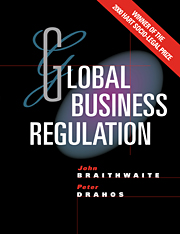14 - Telecommunications
Published online by Cambridge University Press: 04 August 2020
Summary
Telecommunications, perhaps more than most of the domains in this book, raises issues about the impact of invention and innovation on regulatory change. It may be that technology, by changing the opportunity sets of individual actors has in a deeper sense 'determined’ the course of telecommunications regulation. The Internet and associated technologies, for example, may turn out to be the primary cause of another Schumpeterian gale of creative destruction as business actors reorganize themselves around the new opportunities of the technology. But investigating whether technology is a macro determinant of change is not the concern of this chapter. Its focus is on the way that actors have used mechanisms and principles to determine the shape of international telecommunications regulation.
History of Globalization
Telecommunications is a term that was coined in the 1930s (Snow 1986: 7). If we think of it in broad terms as communication over distance, then its history is a long one for it includes semaphore, smoke-signals and many other forms of signalling. It is more usual to think of telecommunications beginning with three nineteenth-century inventions: the telegraph (1837), telephone (1876) and radio (1899). This is where we will start.
Telecommunications regulation contains one of the earliest examples of international regulatory cooperation between states, with the creation of the International Telegraphic Union (ITgU) in 1865. But in other respects the regulation of telecommunications is a story of territorial containment. Much of the early regulatory development in the first half of the twentieth century was influenced by the economic view that telecommunications is a ‘natural monopoly'. But no state thinks that there should be one world monopolist. Instead, the contours of this natural monopoly correspond with state boundaries. This national regulatory containment of telecommunications is in the process of breaking down, often in dramatic ways.
Taxis, Taxes and the Post in Europe
Telecommunications regulation in Europe began with a state monopoly model. State bureaucracies were given the exclusive right to provide telephone and telegraph services. In many cases these bureaucracies had been providers of postal services (the European system is still referred to as the PIT: post, telephone and telegraph system). Postal services became the exclusive province of states because of the revenue needs of cash-hungry European monarchs. Towards the end of the fifteenth century the Habsburgs granted one family the Taxis family monopoly privileges over the carriage of post.
- Type
- Chapter
- Information
- Global Business Regulation , pp. 322 - 359Publisher: Cambridge University PressPrint publication year: 2000



